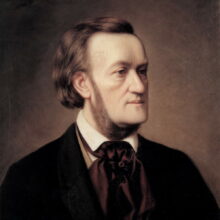 I was recently engaged in a discussion about Wagner's antisemitism and whether or not it had anything to do with the rise of the Nazis. Could it be said that Wagner, in some way, paved the way for the horrors of Auschwitz or Treblinka?
I was recently engaged in a discussion about Wagner's antisemitism and whether or not it had anything to do with the rise of the Nazis. Could it be said that Wagner, in some way, paved the way for the horrors of Auschwitz or Treblinka?
My personal view is that Wagner's music is sublime, but he was a rotten person -and his declared and un-repented antisemitism will forever tarnish his name and make those who admire his music regret his personality a lot. But no: he drank from the same stream of antisemitism that Hitler later did, but there is no Wagnerite ideology that Wagner developed as a coherent philosophy of anti-Jewishness, and neither did he manage to convey an ideology to Hitler or any other Nazi of the 20th Century by any means whatsoever. So no, in short: Wagner didn't give rise to Nazis, or offer them any philosophical or ideological underpinning at all.
In coming to this conclusion, however, I felt it necessary to read the one pamphlet that Wagner wrote (in 1850, when he was 37) that laid out his antisemitism in all its unadorned nastiness. The pamphlet was called Das Judenthum in der Musik, which is sometimes translated as 'Judaism in Music' or 'Jewishness in Music'. It was sent as an article to the Neue Zeitschrift für Musik in Leipzig in September 1850. It's quite short and really doesn't explore very much other than the ideas that:
- A people's great art and music will draw on the history and traditions of the people
- The Jews are essentially landless and excluded from sharing in the traditions of the people they live amongst
- As a result, Jews can't really do art very well, and the only music they can write is based on the tunes of the Synagogue
- Please stop liking Mendelssohn quite so much, because his is just pretty music with no great passion in it
- Please stop paying Meyerbeer quite so much for his Paris operas, because mine never make that much money
It's not exactly a profound philosophical working out of complex metaphysical ideas, in other words!
The trouble was, the only English translation I could find of the article was this one -and the trouble is that that translation is pretty dreadful! (And no offence is intended to William Ashton Ellis for putting it that way!) You get sentences such as "For such a prophet-charge can naught equip, save the deepest, the most heartfelt sympathy with a great, a like-endeavouring Community"... and I lose track of the point being made about 4 words into that sentence! The faux-Victorian language (such as "naught" in that example) is repeated throughout the translation, so that the thing reads like an archaic document (which is a perfectly reasonable approach to take, since it was a 19th Century document), but without making it any easier to really understand what Wagner was ranting on about.
 Accordingly, I've translated it myself, afresh. (Click link or icon to download)
Accordingly, I've translated it myself, afresh. (Click link or icon to download)
That particular sentence is now rendered as "Only the deepest, most soulful sympathy with a great, equal-striving community, whose unconscious expression the poet interprets according to its content, enables such a prophetic office." It's not exactly riveting stuff, even in this new guise: but it's not quite so riddled with deliberate archaisms and non-intuitive sentence-structure either (I hope). I've tried to make it a modern, comprehensible translation in other words, even if that means revising word-order and sentence structure significantly.
The article remains, as it was in 1850, a disgusting and distateful rant from a man whose high culture should have meant he knew better -if not to feel these things, at least to keep quiet about his feelings. Reading and translating it has made me feel quite dirty at times, and I suspect it will probably have that effect on you too. But it is worth reading, because it's the most explicit insight we ever get into Wagner's antisemitic feelings. See if, having read it carefully, you feel as if it's setting out a coherent program for the elimination of Jews from Germany, still less the extermination of the Jews in Germany. I think you will find it doesn't -but don't let me pre-judge that issue for you, either!